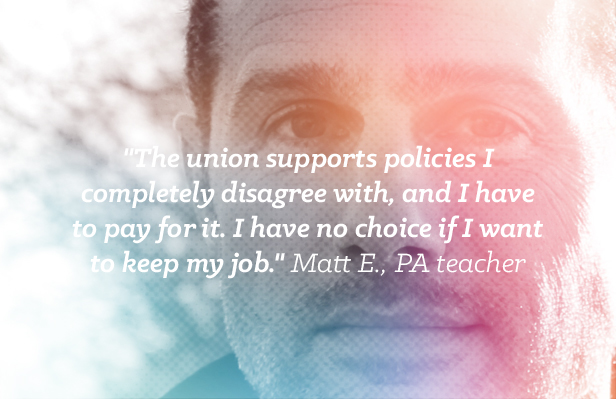Commentary

Paycheck Protection Benefits Teachers and Taxpayers
Note: this commentary was originally published at PennLive.com.
Pennsylvania’s AFL-CIO union boss Rick Bloomingdale is absolutely right that there is a “war on workers” here in Pennsylvania—he should know, because he is waging it. His recent opinion piece on PennLive tries, and fails, to defend the indefensible, getting the facts wrong in the process.
What has Bloomingdale so upset?
It’s a proposal that would simply stop using public resources to collect union campaign contributions and political money for government unions.
Far from an attack on workers, this reform would actually give union members a stronger voice in how their dues and campaign dollars are spent. It is not anti-union. It is pro-worker.
If Rick Bloomingdale were interested in protecting the middle class, he’d be standing alongside teachers like Rob Brough rather than against them.
Just ask Rob Brough, a teacher in Pennsylvania who must pay fees to a government union, the Pennsylvania State Education Association, in order to keep his job.
“Their agenda and political ideals are counter to what I believe, and it is a kick in the teeth every time my dues are withdrawn from my hard-earned paycheck and handed off to some organization that I would never contribute to of my own free will,” Brough said.
Shouldn’t the PSEA have to look Rob in the face, ask him for his $680 in dues, and then explain how the union plans to spend it? Since Rob is forced to pay this money to keep his teaching job, isn’t it fair that he should be empowered to have a stronger voice in how his money is spent on politics?
Right now, the leaders of the PSEA and other government unions don’t have to do that. They can use taxpayer resources to collect campaign contributions and political money directly out of employees’ paychecks.
Not only is this unfair to taxpayers; it hurts the very workers government unions claim to represent. Union members are harmed because union bosses don’t have to explain the unions’ political expenditures to members.
That’s what the legislation Bloomingdale references would fix. And he’s wrong that it would affect “all unions”—it only affects government unions, the ones that represent people whose salaries we taxpayers pay.
Bloomingdale argues that ending this special legal privilege for government unions and requiring them to play by the same rules as everyone else “singles out unions only for unnecessary and burdensome rules and restrictions.”
In reality, it is teachers like Rob who are singled out for onerous and unfair restrictions on their hard-earned money—not union bosses.
Imagine if the National Rifle Association or Planned Parenthood demanded taxpayers pay for the collection of their lobbying funds and campaign contributions. They would be ridiculed and rejected – and rightfully so.
Government unions enjoy this same benefit of using your township, borough, city, and state tax dollars to collect their political money and deny union members the ability to hold their union bosses more accountable. No other private or political organization enjoys this financial and political privilege.
Unions can – and should – play by the same rules as everyone else. One questions how viable and relevant government unions are today if, as Bloomingdale implies, they are so dependent on taxpayer subsidies that they would have to close up shop should they lose this exclusive legal privilege.
Paycheck protection would do one thing: Stop the use of taxpayer resources for politics. That, in turn, would set teachers free, allowing them to make their own choices with their own money. It won’t end collective bargaining or keep unions from collecting dues. They would simply have to do it themselves.
Protecting the paychecks of union members and taxpayers is supported statewide. No less than three separate polls of Pennsylvanians reveal overwhelming support for ending Bloomingdale’s exclusive legal privilege.
One survey of likely voters revealed that 79 percent of voters (and 75 percent of union members) agree that unions should not be permitted to use taxpayer-funded resources to collect government union dues.
The public gets it because no other political group enjoys such privileges on the taxpayers’ dime. There is no greater pro-worker and pro-taxpayer proposal than ending the taxpayer-funded collection of dues and campaign contributions for government unions.
If Bloomingdale were truly interested in protecting the middle class, he’d be standing alongside teachers like Rob Brough rather than against them.
# # #
Matthew J. Brouillette, a former history teacher, is the president and CEO of the Commonwealth Foundation in Harrisburg.